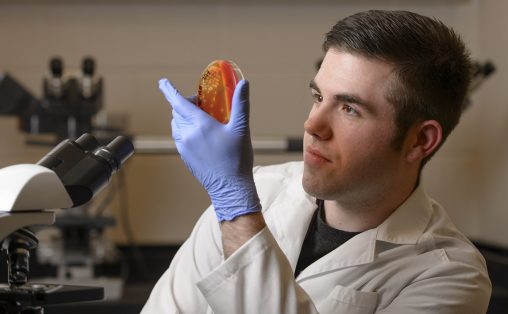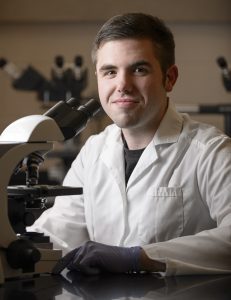
Brandon Baum uses the skills from his biology degree and certificate in Clinical Laboratory Sciences to analyze lab work for CompuNet Clinical Laboratories in Dayton. (Photos by Will Jones)
It’s a pressure-packed job that can mean the difference between life and death — testing for diseases caused by bacteria in order to determine the proper treatment. But Brandon Baum loves the challenge and detective work of it.
The 2017 graduate of Wright State University’s Clinical Laboratory Sciences program works for CompuNet Clinical Laboratories in Dayton. The company does lab work for physicians, hospitals, patients, employers and health care industry organizations in southwest Ohio.
“This job enables me to help people while doing the laboratory work that I love and using my brain to solve the puzzles,” Baum said. “Every single thing I look at is always new, and it’s always challenging me to use my skills to be better.”
Baum’s skills are already pretty good. He graduated from Wright State in April with a cumulative 3.85 GPA and just won a prestigious National Student Honor Award from the American Society for Clinical Pathology, the world’s largest professional membership organization for pathologists and laboratory professionals.
“It’s an honor,” said Baum. “To be one of the people who were nominated for this award in the U.S. feels really good.”
Baum grew up in Piqua and graduated 11th in his class of 400 at Piqua High School in 2010. He earned his associate degree at Edison Community College and then enrolled at Wright State in 2013, majoring in biological sciences.
“I dabbled in ecology. I dabbled in microbiology. I dabbled in infectious disease,” Baum said of his time studying biology. During his senior seminar, he was introduced to clinical lab science, and “it just struck me as the perfect job.”
So after receiving his biology degree, Baum took an extra year to study microbiology, chemistry and hematology as they relate to the care of patients and in 2017 earned his certificate in clinical laboratory science.
“It was very tough. But I always thrive in challenging situations,” he said.

After receiving his biology degree, Brandon Baum took an extra year to study microbiology, chemistry and hematology and earned his certificate in clinical laboratory science.
Wright State’s Clinical Laboratory Sciences program was launched in the 1980s after local hospitals closed their training programs because of an oversupply of medical technicians. And when the University of Dayton terminated its program, Wright State became the lone producer of clinical laboratory scientists in the region.
There is currently a great demand for clinical laboratory scientists in the area because many are retiring or on the verge of retirement. And a shortage is being predicted for several more years.
The Wright State program accepts 14 students a year from a field of twice as many applicants, some of whom hail from other states and countries. Students either obtain a bachelor’s degree in clinical laboratory science or a certificate they can couple with a different undergraduate degree.
The students study hematology, clinical chemistry, microbiology and immunohematology. They go through a summer session of lectures and labs and then work at local hospitals four days a week.
Baum received a full-ride scholarship for the laboratory science program from CompuNet as long as he agreed to work at the company for at least two years after graduation.
“As of now, I think I am where I want to be,” he said. “I honestly wanted to work there anyway. That was my goal.”
Wright State became an independent institution in 1967 and spent the next 50 years growing into an innovative leader in student success. In 2017, it celebrates its 50th anniversary as an independent public university, culminating with a special Homecoming celebration Sept. 29 through Oct. 1.

 Walking through open doors
Walking through open doors  Adventures await
Adventures await  Wright State to expand nursing facilities to meet workforce needs and prepare more graduates for in-demand careers
Wright State to expand nursing facilities to meet workforce needs and prepare more graduates for in-demand careers  Wright State student-athletes make a lasting impact on local family with more to come
Wright State student-athletes make a lasting impact on local family with more to come  Wright State names Rajneesh Suri dean of Raj Soin College of Business
Wright State names Rajneesh Suri dean of Raj Soin College of Business 